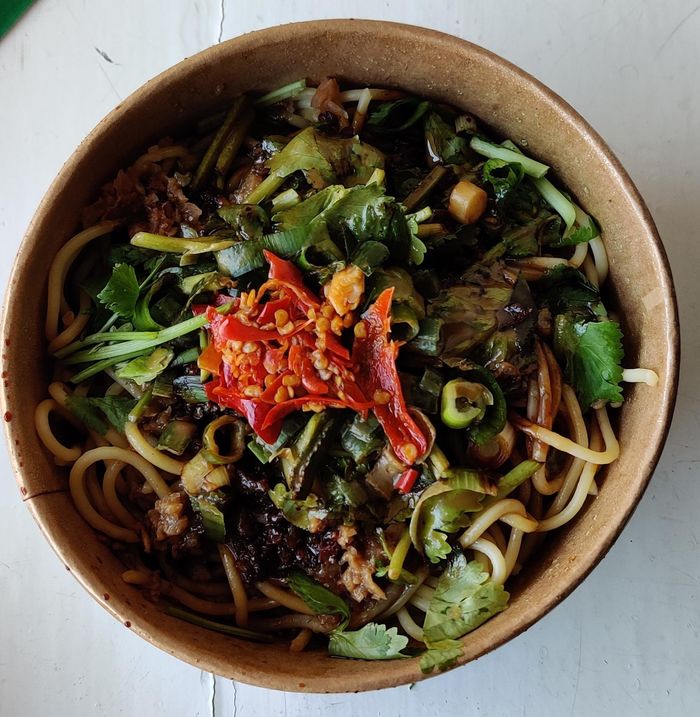Making sustainability sustainable
Kefeshe Bernard discusses veganism, race, and easy and accessible ways we can all contribute to our environment
I identify as a second-generation Black Caribbean, and at first, I saw going vegan as potentially losing culinary ties to my Trinidadian heritage. I knew that there would be limited options for plant-based versions of my favourite foods - roti, crab and dumplings, bake ‘n’ shark - which, in the past, had enabled me to connect with my family. It seemed like, in choosing to live a more planet-friendly lifestyle, I had no choice but to say goodbye to my ethnic heritage. Alongside this, veganism has always been presented to me as an expensive and niche movement for middle-class white women. I was concerned that vegan community spaces would feel exclusive and uncomfortable.
It has been three years since my initial switch to a vegan diet and lifestyle: a lot has changed in that time. I’ve been able to find spaces for people like me - Black and Caribbean vegans - make friends in the community and work together on different environmental and social justice projects. Far from the sea of white middle-aged faces crowding the streets of London at my first Extinction Rebellion protest, I have been able to make my climate activism accessible, fun and truly culturally sensitive.
“I’ve been able to find spaces for people like me - Black and Caribbean vegans - and make friends in the community”
Ultimately, living consciously is less about your actions - what you do and don’t do - and more about your mindset. The way I see it, mindset is what allows us to continue damaging the natural world; we believe that we exist outside of her (the Earth) and that she is here for our use. Likewise, a shift in mindset to become more humble can make a world of difference. As a collective species, if we were to see the natural world as worthy of respect, care and love, that’s when we can really provide a challenge to the climate crisis. For me, this is where I see the future of vegan diets and lifestyles as the norm.
In 2018, when I made the switch to a vegan lifestyle, I experienced a significant shift in mindset: I realised that non-human animals, the Earth, other human beings, all of these do not exist for the benefit of individuals. While I have a subjective experience of life, that does not mean that I am the only subject in this life. Instead, I began to see my role in life as one of stewardship. I receive what the Earth gives me, it is not my place to take, whether that be natural resources or the life of another.
I see my role within the ecosystem of the climate movement as one of caregiving and building. That is, building spaces so that I can care for as many people as I can who are impacted by this crisis; feeling their bellies, minds and souls. Through creating content on living a vegan and low-waste lifestyle on Instagram (@kefeshebernard and @kefesheskitchen), I demonstrate to others on social media that although it may take some adjustment, it is not impossible to reconsider our behaviour and thought patterns. At the same time, I understand that sustainable living can be culturally isolating and expensive to participate in, and I am still faced with the challenges of finding food or low-waste items when I leave my Cambridge bubble. It is things like this that have allowed me to understand the importance of each individual doing their best in each moment, without expecting to live perfectly all of the time.
Ultimately, we can all make a difference simply by adjusting our approach to consumerism and our relationship with our world:
- Consumption and consumption mindsets: Reducing consumption of animal products, fast fashion products and honouring the value in less.
- Local Groups: Joining a local youth group! There are roles for every type of person in these organisations, and if one doesn’t work for you, maybe try another! I’d suggest getting started with your college environmental campaign first.
- Open-mindedness: It’s always a bad idea to make dramatic lifestyle changes overnight! Instead, be gentle with yourself and make small changes over time. If you’re hesitant about the idea of vegan meat, for example, maybe try it once and if it doesn’t work for you, that’s okay!
Creating and finding an intersectional, diverse and accessible community within the environmental justice movement has been incredibly empowering. I’ve learnt that organising and participating in protests, creating planet-friendly vegan meals and seeing how empty a rubbish bin can be are effective ways to take action. Involvement in the climate movement allows me to meet like-minded young people, knowing that I am not alone in my passion, and helps me to find fun in sustainable living.
 News / SU reluctantly registers controversial women’s soc18 December 2025
News / SU reluctantly registers controversial women’s soc18 December 2025 News / CUP announces funding scheme for under-represented academics19 December 2025
News / CUP announces funding scheme for under-represented academics19 December 2025 Features / Should I stay or should I go? Cambridge students and alumni reflect on how their memories stay with them15 December 2025
Features / Should I stay or should I go? Cambridge students and alumni reflect on how their memories stay with them15 December 2025 Fashion / The art of the formal outfit 18 December 2025
Fashion / The art of the formal outfit 18 December 2025 News / Dons warn PM about Vet School closure16 December 2025
News / Dons warn PM about Vet School closure16 December 2025










